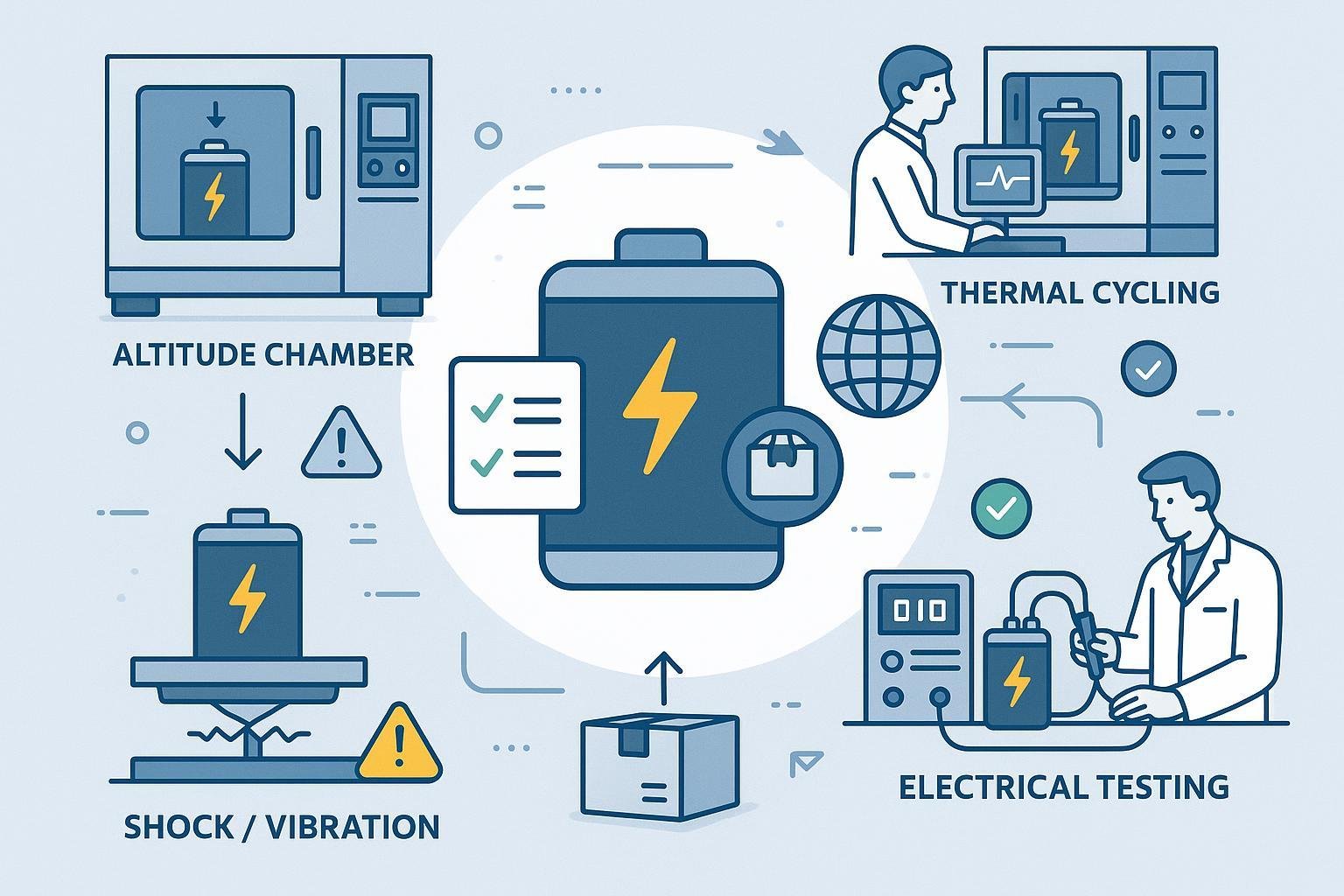
UN38.3 is Section 38.3 of the United Nations Manual of Tests and Criteria, requiring all lithium batteries and cells to pass a series of stringent tests to ensure they can be safely transported worldwide by air, sea, road, or rail (source: UN Manual, Rev 8, 2023).
Understanding UN38.3: The Essential Transport Safety Standard
UN38.3 certification is mandatory for the legal international shipment of lithium batteries—whether standalone, inside devices, or as spare packs. The standard consists of eight laboratory tests (T1–T8), each simulating potential hazards during transit. Passing these tests is a prerequisite for shipping with most global carriers (e.g., FedEx, UPS, international freight) and is enforced through IATA, ICAO, DOT, IMDG, and local laws.
The Eight Mandatory UN38.3 Tests (T1–T8)
UN38.3 testing must be performed in sequence using a minimum of battery samples as defined by the standard. The tests, with their main purpose and pass/fail criteria, include:
| Test | Name | Simulated Hazard | Main Criteria (Pass/Fail) |
|---|---|---|---|
| T1 | Altitude Simulation | Low air pressure | No leakage, vent, disassembly, rupture, fire, ≥90% pre-test V |
| T2 | Thermal Test | Extreme temp changes | Same as above |
| T3 | Vibration | Repetitive motion | Same as above |
| T4 | Shock | Sudden acceleration | Same as above |
| T5 | External Short Circuit | Electrical fault | No fire/disassembly within 6 hours, ≤170°C casing temp |
| T6 | Impact/Crush | Mechanical abuse | No fire/disassembly, ≤170°C |
| T7 | Overcharge | Excess charging (rechargeable only) | No disassembly/fire/explosion |
| T8 | Forced Discharge | Incorrect cell wiring | No disassembly/fire/explosion |
After all tests, batteries must retain at least 90% of their pre-test open circuit voltage and show no visible safety defects. Test results must be compiled in an official test summary document (per IATA DGR Guidelines).
UN38.3 Compliance Checklist
- Select recognized test laboratory (accredited by national/international bodies)
- Prepare adequate, correctly manufactured battery samples
- Undergo T1–T8 tests in proper order (per the UN Manual)
- Document all test results and create the official test summary sheet
- Compile supporting paperwork: MSDS/SDS, shipping declaration, packaging/labeling compliance
- Provide documentation to carriers, customs, and customers when requested
- Maintain documentation for each battery/battery pack shipped internationally
Non-compliance results in rejected shipments, legal penalties, and supply chain delays.
Real-World Relevance and Application
Every lithium battery—whether for consumer electronics, power tools, EVs, or industrial systems—must meet UN38.3 before being legally shipped internationally. For example, a batch of batteries may be delayed or destroyed at customs if the required UN38.3 test summary is missing or incomplete, leading to financial loss and project delays. Companies designing batteries should integrate compliance early, allocate up to 6–8 weeks for the testing process, and budget accordingly.
Comparison With Related Standards
| Standard | Core Focus | Shipping Legal Requirement | Product Safety Requirement |
|---|---|---|---|
| UN38.3 | Battery safety in transport (transit simulation) | ✔ | |
| IEC 62133 | Rechargeable battery safety/performance | (sometimes, by region) | ✔ |
| UL (e.g., 1642, 2054) | Electrical/fire safety for end-use | ✔ |
UN38.3 is required for shipping, IEC/UL are often needed for market entry and consumer/device safety.
Related Concepts in Context
- MSDS/SDS: Material Safety Data Sheet, required for hazardous goods declaration.
- Dangerous Goods: Lithium batteries are classified as such under international law.
- BMS: Battery Management System—critical for battery safety but not a substitute for UN38.3 compliance.
- IATA/IMDG: Key regulations referencing UN38.3 for air and maritime shipping.
Authoritative Resources
- UN Manual of Tests and Criteria, Rev 8, 2023 (Official Source)
- IATA Lithium Battery Guidance
- Intertek UN38.3 Testing Guide
This article is intended for battery manufacturers, buyers, engineers, and compliance professionals needing an authoritative, actionable overview of the UN38.3 transport safety standard.

